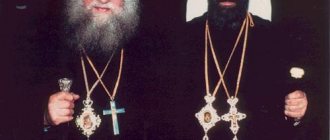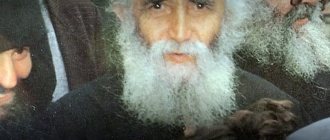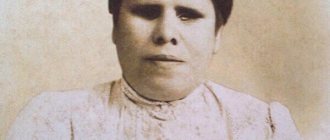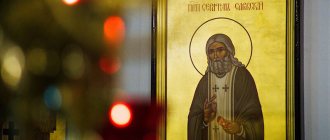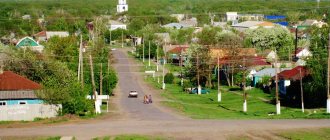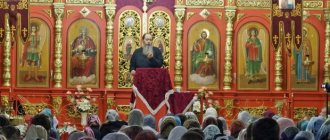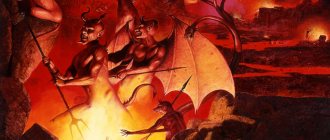Metropolitan Anthony of Sourozh
THE LEGACY OF A HERETICAL METROPOLITAN The “Spiritual Heritage of Metropolitan Anthony of Sourozh” Foundation is holding a seminar from the series “Human Integrity: The Path of Discipleship,” dedicated to the “works” of Metropolitan Anthony of Sourozh. Metropolitan Anthony of Sourozh (Blum) is one of the popular ecumenical writers. His books are published in thousands of copies, including “The School of Prayer,” “Man Before God,” “Spiritual Journey,” and numerous sermons. The intelligentsia loves him, the words from his sermons are heard from church pulpits, there are often references to his “works” in literature and the media, but after reading them you discover that the Metropolitan of Sourozh relies more on the experience of a heterodox faith than on the patristic Orthodox tradition. An important detail is that Anthony of Sourozh, to please the Protestants, spoke out in defense of the female priesthood. His works are filled with reflections about himself, where self-satisfaction and praise of his person are indirectly traced. The Holy Fathers, on the contrary, never allowed people to talk about themselves, considering this a sign of a proud disposition. But here is his attitude towards the Roman Catholic and Protestant heresies: “Each of our Christian communities remains faithful to Christ, in each there is truth and full depth.” But we know that only the Orthodox Church possesses the fullness of the truth revealed by God to humanity, and Roman Catholicism after the Second Vatican Council (1962–1965) turned from the heretical Christian denomination that it had been until now into a neo-pagan anti-Christian religion. Metropolitan Anthony diligently quotes Catholics - the French Jesuit Bernanos, J. Danielou, General Maurice de Elbo, as well as Protestant false teachers, not only without warning, but, unfortunately, presenting “poison” as a pure source of truth. Thus, he cites excerpts from the works of the writer C. S. Lewis, an adherent of the Anglican faith. The story of his conversion is described by him in the book “Overtaken by Joy,” after reading which it becomes clear who “overtook” poor Lewis. Unfortunately, the root of this demonic joy is also present in the works of Bishop Anthony, who does not even disdain the heretical Protestant translation of the Bible. Speaking about “humility,” he cites Teresa, revered by Catholics, as an example to follow: “When Saint Teresa was overcome by a vivid experience of God’s all-consuming love for us, she fell to her knees with tears of joy and amazement; she rose up as a new person; the vision of God’s love left her in the “consciousness of an unpayable debt,” this is true humility - and not humiliation, concludes Metropolitan. Anthony. The Monk Ephraim the Syrian says about himself: “Until now and to this very day, with a shameful and downcast face, I dare to proclaim to You, Lord of Angels and Creator of all things: I am earth and ashes, a reproach of people and humiliation of people, I am a condemned man, all covered with wounds and full of despondency. How can I lift my gaze to Your grace, Master? How dare I move an unclean and defiled tongue? How will I begin my confession? And Metropolitan Anthony assures that “humility does not at all consist in a constant effort to humiliate oneself and reject the human dignity with which God has endowed us, which he requires of us, because we are His children, not slaves.” But to anyone familiar with the teaching of the Holy Fathers, it is obvious that this is not humility, but the proud magnification of a person who autocratically arrogates to himself the honor of sonship, while he cannot even be called a servant of God. “Unworthy of the Lord, unworthy of imitation is the one who is all in filth and impurity, and with a stupid, proud, dreamy opinion thinks to be in the arms of the Most Pure, Most Holy Lord, thinks to have Him within himself and talk with Him as with a friend,” writes Saint Ignatius. - Human! Cover yourself reverently with humility.” It is not clear what prompted the Bishop to resort to such an innovation, which has never had a place in the teachings of the Church. How does he choose from heretical and godless teachings something that cannot in any way serve as a good example, without heeding the words of the Hieromartyr Irenaeus, who says: “We should not seek from others the truth, which is easy to borrow from the Church, for in it, as if in rich treasury, the Apostles laid down in full everything that belongs to the truth...” Saint Ignatius directly warns, saying: “Do not play with your salvation, do not play! Otherwise you will cry forever. Start reading the New Testament and the Holy Fathers of the Orthodox Church (not Teresa, not Francis and other Western crazy people whom their heretical church passes off as saints!); Study in the Holy Fathers of the Orthodox Church how to correctly understand Scripture, what kind of life, what thoughts are appropriate for a Christian. From Scripture and living faith, study Christ and Christianity...” There have been many such ascetics in the Western Church since the time it fell into papism, in which Divine properties are blasphemously attributed to man and worship is given to man that is due and befitting the one God; These ascetics wrote many books from their heated state, in which frenzied self-delusion seemed to them like divine love, in which their frustrated imagination drew for them many visions that flattered their vanity and pride. Very often ow. Anthony also uses his own experience as an example. So, he recalls how he visited Met. John Wendland Hindu temple: “When we knelt in the depths of this temple and both prayed the Jesus Prayer, the people who were there, despite the error of their faith, turned to God, it was absolutely clear that they were praying to the One, the only God " Thus, he claims that in the temple there is communication between the pagans and the true God, the Holy Trinity. What else can such a statement be called blasphemy?! In his “School of Prayer” Met. Anthony teaches us to pray like this: “We can repeat over and over again: joy, oh, joy...! We can say any words, because words have no meaning, they only support our mood, express absurdly, madly, our love or our despair.” But if the words in prayer have no meaning, then it is no longer a prayer, but a spell. It is the spells (mantras) that have no semantic meaning and are a kind of set of words. This practice belongs to Eastern occultism and has nothing in common with Orthodox teaching. Frequent repetition of meaningless spells turns off a person’s inner attention, which is necessary for demons to gain power over him. Through spells, many have let the devil into their souls and reached the point of mental frenzy. But even more perplexing are the examples from the life of the Hasidim that are given in the named “School”. Thus, the Vladyka, in admiration, writes about the young Rabbi Tsussii: “He [Tsussii] knew how to influence all people in an amazing way, arousing repentance in them, arousing new life in them.” Apparently, this rabbi had a tremendous influence on the Lord, praising the “repentance” of those who never had true repentance, who crucified Christ, and themselves imposed a curse on the generations of their descendants, testifying: His blood be on us and on our children (Matt. 27, 25); and who say about themselves that they are Jews, but they are not, but the synagogue of Satan (Rev. 2:5). “None of the Jews worship God,” says St. John Chrysostom. “And that is why [I] especially hate the synagogue and abhor it, because, having prophets, [the Jews] do not believe the prophets; reading the Scriptures, they do not accept its evidence, and this is characteristic of extremely evil people... In a word, if you respect everything Jewish, then what do you have in common with us? If what is Jewish is important and worthy of respect, then ours is false, and if ours is true, and it is in fact true, then what is Jewish is full of deception.” And the reasoning of Vl. Anthony about the Judgment of God? This is the judgment of a Protestant, a person “saved” before the Judgment: “God asks neither sinners nor righteous people about their beliefs or observance of rituals,” Metropolitan rants. Anthony, “The Lord weighs only the degree of their humanity... Humanity requires imagination, sensitivity to the real situation, a sense of humor and loving care in relation to the true needs and desires of the object...” But, excuse me: which of the Holy Fathers placed these qualities among the Virtues? ... And did the bishop ask himself the question - why did Christ come to earth? Why did you die on the cross? After all, if it doesn’t matter how you believe, then the suffering of Jesus is in vain. But Vladyka Anthony does not explain that Christ came in order to bring the true teaching in its entirety, in order to lead sinners to repentance, and there is salvation in no one else, for there is no other name under heaven given to men by which we should be saved . The works of Bishop Anthony are filled with the poison of ecumenism. Adherents of this false teaching accuse the Church of apostasy from the truth, saying that it allegedly violated Christ's commandment about unity. Such a belief is wrong, for the True Church is holy and immaculate, and if anyone has violated the commandment of unity, it is those who have departed from the one truth of Orthodoxy. But the doors of the Church are open for them too. We accept them only after renouncing our errors. The ecumenical heresy seeks to round off all the sharp corners, to equalize all religions to a certain universal state, so that everyone recognizes “unity.” To do this, ecumenists, under the guise of “love,” try to find new points of contact, bypassing disagreements. But that is why it is necessary for every Orthodox Christian to be vigilant about the books that we read, so as not to accept the spirit of the ecumenical virus. Everyone will give an answer at the Last Judgment not only for reading, but also for distributing, and for that silence, which is inappropriate at the sight of a neighbor reading such books. Here is how Saint Ignatius writes about this: “Do not be seduced by the loud title of the book, which promises to teach Christian perfection to those who still need the food of infants; do not be seduced by the magnificent publication, nor by the painting, the power, the beauty of the style, nor by the fact that the writer is like a saint, as if he had proven his holiness by numerous miracles... The soul can be killed by one thought that contains some kind of blasphemy, subtle, completely imperceptible to those who do not know...” Woe to the shepherds who destroy and scatter the sheep of My pasture! - says the Lord. A shepherd must not only be able to heal sheep, but also protect them from wolves. But if, under the pretext of love, he gathers both sheep and wolves into one herd, then he is not a shepherd, but a wolf in sheep’s clothing. Saint Ignatius, as the true shepherd of the flock of Christ, warns us, saying: “You are allowed to read only those books about religion that were written by the Holy Fathers of the universal Eastern Church. This is what the Eastern Church demands from its children. If you reason differently, and find the command of the Church less solid than the reasoning of yours and others who agree with you, then you are no longer a son of the Church, but a judge of Her...” The article uses materials from the book. I.N. Andreeva. “Saint Ignatius (Brianchaninov) and the “School of Prayer” of Metropolitan Anthony of Sourozh (Blum)”, as well as “Man Before God” and “About the Meeting” by Anthony of Sourozh ruskalendar.ru
tonsure and medical practice
After graduating from school, Andrei entered the Sorbonne to study natural sciences and then to the medical faculty, which he graduated from by 1939. Having chosen the specialty of a surgeon as his profession, the young man, however, does not cease to dream of a monastic calling and, on the eve of sending him to the front, pronounces monastic vows before his spiritual father. But due to lack of time, the future bishop took monastic vows later, only in 1943, receiving the name Anthony.
The young man went through the entire war, performing the duties of a field surgeon, operating and saving the wounded. He healed his patients not only with a scalpel, but also with his sincere love, care and participation. Having encountered many doctors during his years of military service, Anthony sometimes saw their extreme callousness and coarseness caused by the horrors of war. But he himself remained humane and merciful both during military operations and until his death.
Church service
Another significant meeting takes place in the life of a young monk at the Orthodox Anglican Congress. This time, Archimandrite Leo (Gillet) has a direct influence on Anthony’s fate, expressing in a personal conversation his opinion on the need for the young man to take the priesthood and leave the profession of a doctor.
In 1948, Anthony was ordained as a hierodeacon, and soon as a hieromonk, after which he took spiritual leadership over the members of the Orthodox Anglican Commonwealth.
From this moment on, Father Anthony is rapidly approaching the main ministry of his life. In 1950, he was appointed rector of the temple in London, and in 1953 he was ordained to the rank of abbot. Three years later he becomes an archimandrite and a little later - rector of the Church of the Dormition of the Mother of God and All Saints in London. Already in 1957 he received the rank of bishop, and in 1962 - archbishop.
Soon the Sourozh diocese was established in Britain, which became the first archbishop's see of Bishop Anthony. And from 1966 to 1974, already elevated to the rank of metropolitan, he served as Patriarchal Exarch in Western Europe.
All this time, the bishop has been actively preaching, writing articles, and giving lectures. A little later, he appears on radio and television, and these speeches are broadcast in Russia and become a spiritual beacon for thousands of Russian citizens who at that time had limited access to any spiritual and theological literature.
In 1983, the Metropolitan was awarded the degree of Doctor of Theology for his pastoral, theological and missionary works.
Last months of life
The last year of ruling the diocese turned out to be especially difficult for the bishop; the situation was aggravated by a surgical operation he underwent at the beginning of 2003. Weakened by illness, Metropolitan of Sourozh was forced to submit a request for retirement, which was granted by the Holy Synod of the Russian Orthodox Church on July 30, 2003, just 5 days before the death of the bishop. Recently, the patient could no longer speak and communicated using gestures, so the London Hospice staff allowed only a few to see the dying man.
Metropolitan Anthony died on August 4, 2003, and on the 13th, in the Cathedral of the Dormition of the Mother of God and All Saints in London, Metropolitan Philaret of Minsk and Slutsk, co-served by other church hierarchs, performed the funeral service for him. Thus, with the death of this outstanding man, an entire era in the history of the Russian Orthodox Church ended.
